The health industry is experiencing an era of digitalization, driven by the rapid adoption of software for healthcare. According to a research report, the Electronic Health Records (EHR) market will likely increase by 32.27 billion with an annual compound growth of (CAGR) 12.91 percent between 2022 and 2027. Healthcare Software As a Service holds a promising future due to the utilization of advanced technologies, including AI, the Internet of Things, Electronic health records, telemedicine, and many more. These advanced software solutions have proven to be beneficial in different ways, including better monitoring of patients, efficient workflow, and enhanced productivity.
Healthcare software development follows a rigorous process of creating apps and system software, revolutionizing the healthcare industry. It's a technology-driven method of developing software solutions that can improve patient care, increase the efficiency of administrative and clinical workflows, and lower healthcare costs.
Read Also: Custom Healthcare Software Development: Top Benefits and Trend in 2024
Current Trends and Future Visions in Healthcare Software Development
The software market for healthcare has been trending over the past few years, leading to digital innovation and the constantly changing needs of the healthcare industry. Following are the latest trends that will reshape the future of healthcare software. Let's delve into it:-
Internet of Things (IoT)
It is believed that Internet of Things (IoT) devices, such as wearables or smart sensors, can continuously monitor health and gather data outside of a medical setting. The collected data integrates with healthcare software, enabling patients to monitor and manage chronic diseases from their comfort zone. Also, it detects and recognizes possible health problems early.
Blockchain Technology
Blockchain technology has proven to be an efficient and secure method of managing and storing sensitive health information. This will improve data security and integrity, allowing patients to access their medical records easily.
Cloud-Based Solutions
Cloud-based healthcare solutions are scaleable, enabling healthcare organizations to adjust to changing demands quickly. Cloud-based software can be used from any location with access to the Internet, encouraging remote collaboration and improved accessibility for patients who live in remote regions.
Medical Imaging
Medical imaging is vital in modern healthcare. It is a popular software that takes scans of bones, organs, and tissues. The latest developments in this field are 3D-based Medical Image Viewers. These tools assist in analyzing the complex medical images created from CT scans, MRIs, or ultrasounds and convert them into a 3-D format. Healthcare software is likely to create endless opportunities in the near future.
Data Analytics and Predictive Modeling
Data Analytics and Predictive Modeling help identify possible health risks, anticipate disease outbreaks and optimize healthcare resources.
Integrating Virtual Reality (VR) and Augmented Reality (AR)
Integrating Virtual Reality (VR) and Augmented Reality (AR) is an advanced healthcare software development solution used to train healthcare professionals and other healthcare personnel in a secure and controlled setting. In addition, AR has the potential to revolutionize the way surgery is performed by giving surgeons real-time data visualization during complicated procedures.
The possibilities for AI-powered robotics healthcare automation for Healthcare delivery promise to assist medical institutions with various tasks. These could include robotic surgeries, medication dispensing, and administrative tasks, freeing up space for interaction with humans and complex decisions.
Must Read: Best Practices and Strategies for Custom Healthcare App Development
What Are The Advantages Of Customized Healthcare Software Development Solutions?
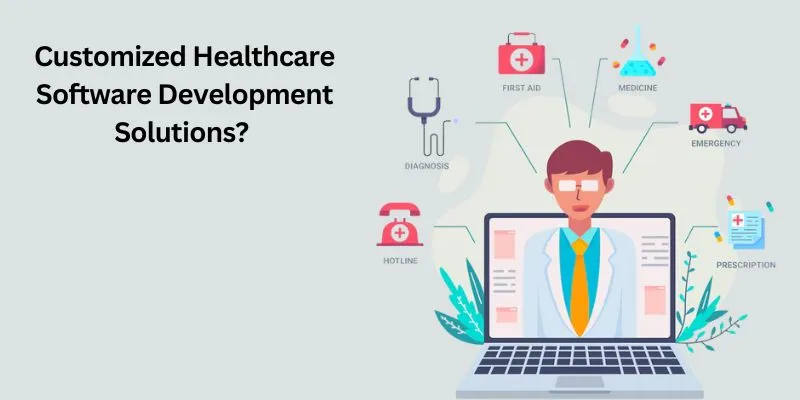
Custom Healthcare Software Development offers numerous benefits to both patients and healthcare professionals. Let's examine how these innovations transform the field of healthcare.
-
Enhanced Patient Experience and Outcomes
-
Improved Diagnosis and Treatment Plans
EHRs offer a central platform to store and access the patient's information. This provides a greater understanding of a patient's medical background, which leads to more precise diagnoses and individualized treatment plans.
-
Patient Engagement and Empowerment
Mobile health apps (mHealth) allow patients to participate actively in healthcare activities. These apps offer medication reminders, symptom trackers, educational tools, and tools for managing chronic illness. The development of personalized medicine allows patients to tailor treatments to suit their specific medical profile and genetic makeup.
-
Increased Accessibility to Specialists and Reduced Geographical Barriers
Software for telemedicine and virtual healthcare platforms allows patients to interact with healthcare professionals remotely. This reduces the requirement that patients travel long distances or miss work for appointments. This is particularly helpful for those who live in remote areas or those with mobility limitations. Facilitating remote consultations allows patients to access more doctors and improves their overall health.
-
Increased Efficiency and Productivity for Medical Professionals
-
Reduced Time Spent on Administrative Tasks
Hospital Management Software (HMS) automates tasks like appointment scheduling, patient record management, and billing. This frees time for nurses and doctors to concentrate on what matters—providing top-quality patient medical care.
-
Enhanced Decision-Making Capabilities
Advanced analytics tools that integrate with specific HMS software allow for the analysis of the patient's data and provide insight, enabling healthcare professionals to make informed treatment decisions.
-
Facilitated Access to Specialist Consultations
Telemedicine platforms enable doctors to communicate with specialists via the Internet and draw on an array of specialists in difficult cases. This can result in better patient outcomes and may decrease the need for referrals.
-
Improved Communication and Care Coordination
EHRs provide a central platform to all healthcare institutions involved in a patient's care to share and access their medical data effortlessly. This facilitates better coordination and communication between healthcare providers, which results in improved efficiency of healthcare teams.
-
Administrative Efficiency and Cost Reduction
Healthcare software development can yield significant cost savings for healthcare facilities by automating tasks, reducing paperwork, and reducing errors. This enables the organization to manage resources more efficiently and to focus on providing top-quality patient care.
Medical Software Development Services
Healthcare software development requires a distinct mix of technical knowledge and knowledge of healthcare. Here's a brief overview of the essential services offered by software development companies for healthcare:
Needs Assessment and Consulting
Before beginning the development process, experienced consultants are able to collaborate with healthcare organizations to identify their unique requirements, issues, and desired functions. This allows them to determine the scope of the project and help determine the most appropriate strategy (custom development as opposed to. from the shelves).
Custom Software Development
Medical software development companies specialize in developing custom software solutions designed to meet an organization's unique needs. This entails designing, coding, testing, and then installing the software, which ensures easy integration with existing digital tools.
Integration Services
Modern healthcare facilities typically use a range of software options. Teams of developers can ensure that the systems are in sync to ensure smooth data exchange and streamlined workflows.
Mobile App Development
The rapid growth of mHealth applications requires experts in the creation of safe, user-friendly mobile apps for healthcare professionals.
Telemedicine Platform Development
Companies that specialize in the development of healthcare software can build robust, HIPAA-compliant telemedicine systems that allow remote consultations and virtual delivery of care.
Ongoing Maintenance and Support
The reliability of healthcare software is dependent on ongoing maintenance. Development teams provide support to ensure the software works efficiently, is updated with security patches, and can adapt to the company's demands.
If you partner with a reputable healthcare software development firm, healthcare providers can benefit from specialization to design efficient, secure, and user-friendly software. As a result, it offers top-quality care to patients.
Read About: What Does the Future Hold for Custom Healthcare Solutions?
What Are Different Types of Healthcare Software Solutions?
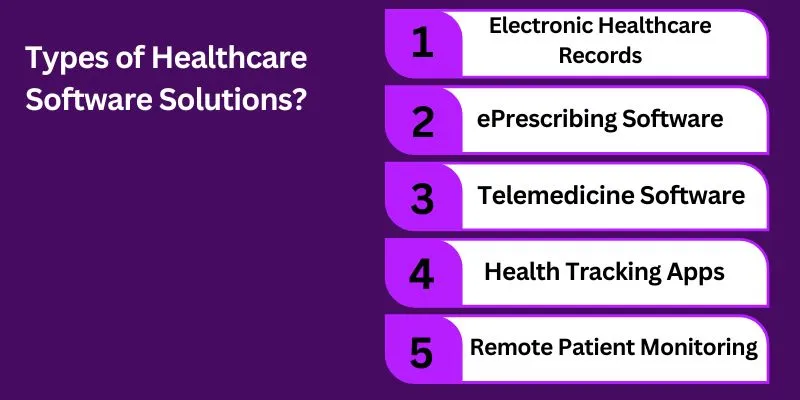
If you're offering healthcare services and doing all healthcare-related work manually, there's no need to do so. With the advent of Healthcare Software Solutions, you can perform tasks efficiently and effectively. Following are the healthcare software development that are being used by the healthcare industry:-
Electronic Healthcare Records (EHRs)
EHRs are electronic records that consolidate patient data, which includes medical history, treatment plans, and test results. Features such as real-time updates and integrated lab results make them invaluable. For instance, Epic Systems provides an extensive EHR system, which is extensively employed in hospitals. This system improves patient care and data accuracy.
ePrescribing Software
ePrescribing software simplifies the prescribing process, minimizes errors, and increases medication adherence. Features such as drug interaction tests make it stand out. Take a look at Surescripts, which offers an integrated system that allows safe electronic prescribing.
Telemedicine Software
Telemedicine provides remote consultations and can bridge the gap between healthcare providers and patients. For instance, telemedicine software allows appointments, video consults, and electronic prescriptions, making healthcare more readily available and accessible.
Health Tracking Apps
The apps allow users to track their health indicators, like heart rate or steps. Fitbit is a good example. It offers a user-friendly interface for monitoring health and fitness goals and encourages active health management.
Remote Patient Monitoring
This technology permits continuous monitoring of a patient's health status remotely. Systems such as Philips eCareCoordinator provide real-time information tracking, alerting healthcare professionals to potential problems and helping to avoid complications.
Also Read: A Guide For Estimating Healthcare App Development Cost
Why Opt for Custom Healthcare Software Development Companies?
Developing custom healthcare software companies is more than just implementing technology. It's about implementing solutions that align with your specific principles of operation and philosophy of patient care.
With the help of expert health software experts, you'll create a solution that is efficient and sensitive to the needs of your staff and patients. But that's not all. Healthcare software customized by software development helps you in a variety of ways. For instance,
Customized to meet the specific needs of each client
Every healthcare facility has its own unique needs and challenges. Healthcare software development customized solutions according to specific requirements, whether for hospitals, a small clinic, or an elderly healthcare app solution.
Flexibility and Scalability
The more your healthcare business expands, the more your IT requirements will increase. Custom solutions allow you to expand or alter features according to changing requirements, which software from the shelves typically needs to catch up with.
Integrity of Existing Systems
One of the biggest hurdles in embracing new technologies is making sure that they integrate seamlessly with existing systems. Custom software is designed to work seamlessly with existing infrastructure, improving overall effectiveness.
Increased Security
Custom software development can provide secure, custom-designed security features, securing the privacy of patient information more effectively than generic software.
A Competitive Edge
Staying ahead in a profession as high-risk as healthcare requires using technology to set yourself apart from the crowd. Customized solutions allow you to stay ahead in the competitive market. For instance, with IoT AI, ML wearables, or data analysis, you can incorporate the most recent tech techniques as you want.
Must Read: Healthcare Software Development Everything You Need to Know
The Future of Healthcare Software Development
Healthcare software development is on the right track and will likely change how patients receive care and revolutionize the healthcare industry. What does the future look like:
Artificial Intelligence-powered Diagnosis and Therapy
AI would not be restricted to just processing medical reports or CT scans/X-ray reports but will also be able to predict the progression of the disease and provide treatments accordingly. This is one of the most efficient strategies of healthcare software development with greater accuracy.
AI-driven Drug Discovery
AI will play a greater role in drug discovery, analyzing interactions between drugs and decreasing the time required to design essential drugs.
AI-powered Virtual Assistants
Virtual assistants based on artificial intelligence are expected to develop higher levels of intelligence, aid patients every hour with individual health advice, and guide patients to prevention-based health care.
Final Thoughts
Are you confident enough to begin your healthcare project software? That's a good thing. It's a complicated and precise procedure that requires extensive planning, investment, and expert assistance.
As a specialist in developing healthcare software, JPLoft can manage your customized health software development project. Our development team uses deep industry knowledge and a strict privacy and data security commitment to provide a custom solution that meets individual requirements.
With a strong emphasis on adaptability and continuing learning, we are prepared to help you navigate this intricate and complex procedure, offering expert guidance each step of the way.





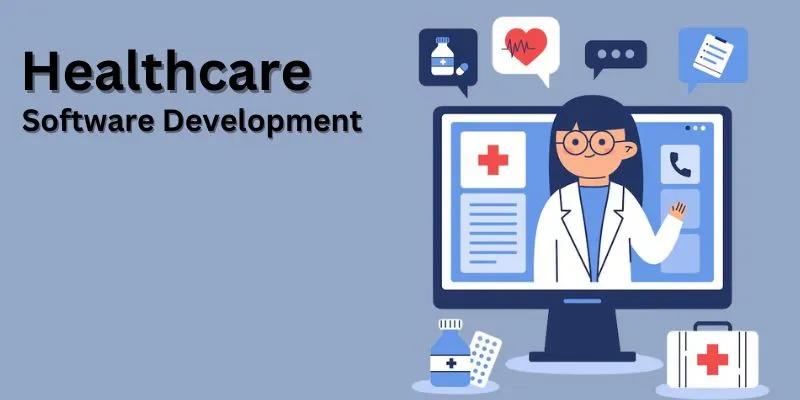
.webp)

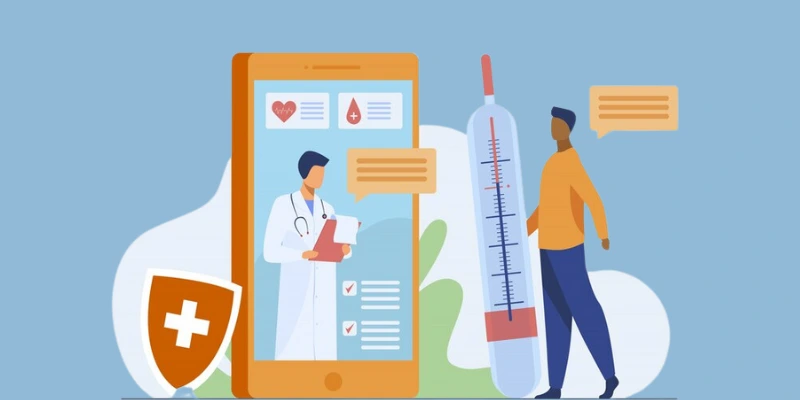
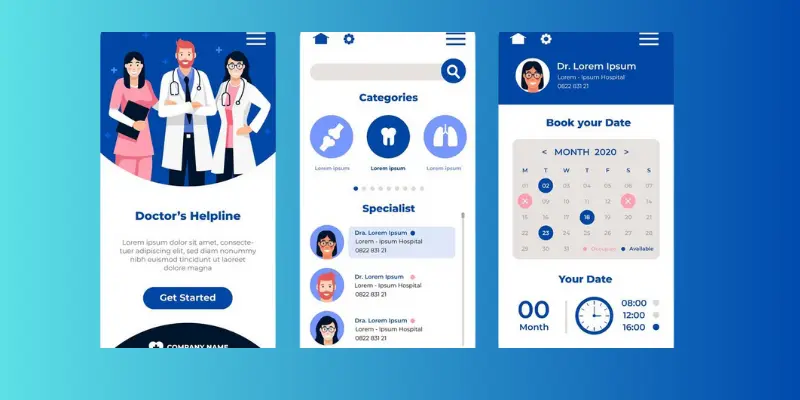




Share this blog